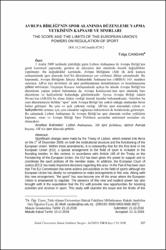Avrupa Birliği’nin spor alanında düzenleme yapma yetkisinin kapsamı ve sınırları
Abstract
1 Aralık 2009 tarihinde yürürlüğe giren Lizbon Antlaşması ile Avrupa Birliği’nin gerek kurumsal yapısında, gerekse de işleyişine dair alanlarda önemli değişiklikler yapılmıştır. Bu değişiklikler içerisinde, Avrupa Birliğinde (AB) ilk defa kurucu antlaşmalarda spor alanında özel bir düzenlemeye yer verilmesi dikkat çekmektedir. Bu kapsamda, Avrupa Birliğinin İşleyişi Hakkındaki Antlaşma’nın (ABİHA) 165. maddesi uyarınca, AB'ye üye devletlere ait spor politikalarının desteklenmesi ve koordinasyonu yetkisi verilmiştir. Geçmişte Kurucu Antlaşmalarda açıkça bu alanda Avrupa Birliği’nin düzenleme yapma yetkisi bulunmasa da, Avrupa Komisyonu’nun spor alanında bazı düzenleme ve faaliyetlerde bulunduğu görülmektedir. Ayrıca Avrupa Birliği Adalet Divanı’nın (ABAD) bu alana ilişkin verdiği önemli kararlar bulunmaktadır. Getirilen bu yeni düzenlemeyle birlikte “spor” artık Avrupa Birliği’nin yetkili olduğu alanlardan birisi haline gelmiştir. Bu yeni ve açık yetkinin varlığı, AB’nin spor alanındaki eylem ve faaliyetlerinin artması için yeni olanaklar sağlaması beklentisini de beraberinde getirmiştir. Bu çalışmada Lizbon Antlaşması ile Avrupa Birliği’ne spor alanında verilen yetkilerin kapsamı, sınırı ve Avrupa Birliği Spor Politikası açısından muhtemel sonuçları ele alınacaktır. Significant changes were made by the Treaty of Lisbon, which entered into force on the 1st of December 2009, on both the institutional structure and the functioning of the European Union. Within these amendments, it is noteworthy that for the first time in the European Union (EU), a special arrangement in the field of sport is included in the founding treaties. In this context, in accordance with Article 165 of the Treaty on the Functioning of the European Union, the EU has been given the power to support and to coordinate the sport policies of the member states. In addition, the European Court of Justice (ECJ) has made important decisions regarding this area. In the Past it has been seen that the EU Commission has some actions and activities in the field of sports although the European Union has clearly no competence to make arrangements in this area. Along with this new arrangement, "the sport" has now become one of the areas where the European Union is empowered to regulate. the presence of this new and explicit power has also brought with it the expectation that the EU will provide new opportunities for boosting activities and services in sport. This study will examine the scope and the limits of the European Union’s powers on regulation of sport, which were given by the Treaty of Lisbon, and its possible consequences with regards to Sport Policies of the European Union.
Source
İnönü Üniversitesi Hukuk Fakültesi DergisiVolume
9Issue
2URI
https://doi.org/10.21492/inuhfd.472912https://app.trdizin.gov.tr//makale/TXpJMk56a3pNdz09
https://hdl.handle.net/20.500.12846/371

















